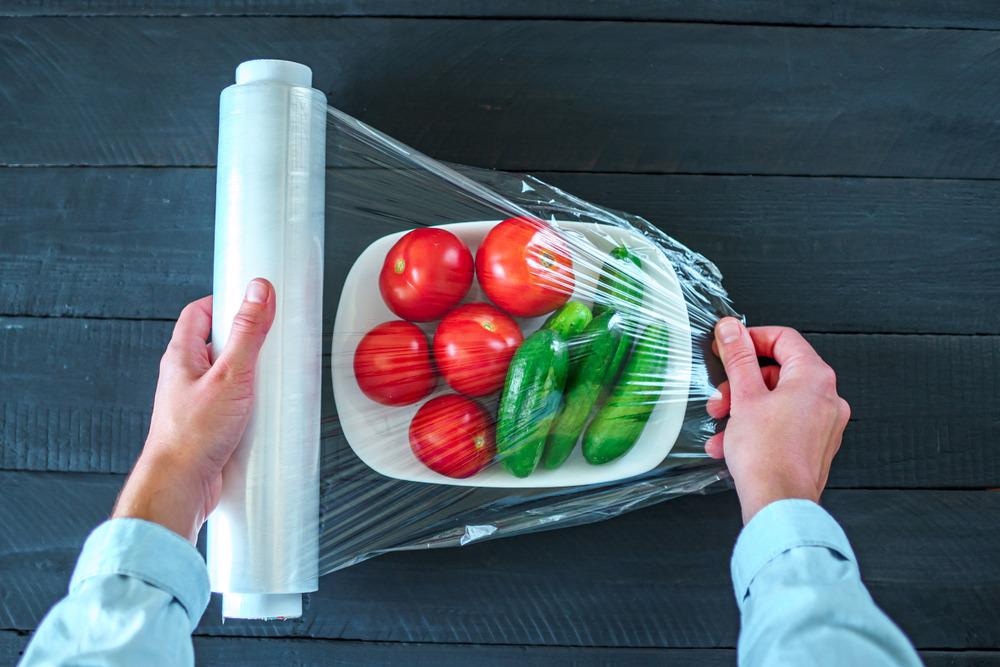
Image Credit: goffkein.pro/Shutterstock.com
An innovative transparent PVC food packaging film, developed by Brazilian technology companies Braskem and Alpfilm, uses silver-silica nanoparticles, paving the way towards the next-generation antimicrobial packaging technology for superior food protection.
Food degradation and spoilage caused by food-borne pathogens and microorganisms cause serious economic and health problems in modern society. In addition to the traditional food preservation methods, such as thermal processing, refrigeration, and drying, a relatively new concept called 'active packaging' is emerging. The idea behind the active packaging concept is to provide interaction between the food and the packaging material and extend the shelf life of food products by maintaining a safe microenvironment.
The ever-growing popularity of ready-made meals that require safe packaging in North America, Europe, and Asia Pacific region, as well as the expanding global food and beverage industries, create an extensive demand for high-quality and cost-effective packaging materials.
Plastic Films for Superior Food Protection
Polyvinyl chloride (PVC) cling films (thin plastic wraps) represent a sustainable choice for fresh food packaging. They extend the useful shelf life of food products and minimize food waste at consumer and retail levels.
A significant advantage of using PVC cling film is that it forms a seal without adhesive, as it clings to itself or the container. PVC cling films are easy and cost-effective to manufacture and highly suitable for automated packaging processes, making them one of the most widely used materials for food packaging and storage.
Alpfilm, a major producer of PVC plastic films, in collaboration with Braskem, the largest thermoplastic resin producer in America, commercialized antimicrobial packaging film called Alpfilm Protect PVC, that is capable of inactivating pathogens, including SARS-CoV-2 (the virus that causes COVID-19), through contact.
PVC Film with Improved Formulation
The Vinyl Application Engineering team at Braskem provided support to Alpfilm in the formulation of the material, which led to the development of a lightweight PVC cling film with excellent chemical resistance, breathability, and durability.
Alpfilm Protect is manufactured by an extrusion process in which granules of PVC plastic are melted and forced through a die to form a bubble. The bubble is then drawn between metal rollers to form a thin film. At the same time, virucidal silver-silica nanoparticles are incorporated into the material.
The polymer-nanoparticle technology was developed and licensed by Nanox, a nanotechnology company based in Sao Carlos, Brazil, and is supported by the Sao Paulo Research Foundation (FAPESP).
Historically, silver has been used to prevent microbial infections. The antimicrobial silver mechanism originates from the formation of silver ions on the metal surface when exposed to water. Humidity also facilitates the transport of silver ions to the bacteria, where they interact with the sulfur-containing proteins in the cell wall and cause malfunctioning of the bacterial cell wall. This process is assumed to be the primary mechanism behind the antimicrobial action of the silver.
Virucidal Silver-Silica Nanoparticles Against COVID-19
Using nanoparticles with a larger surface area greatly enhances the antimicrobial activity due to the increased ions. Therefore, nanocomposites made from silver nanoparticles and polymers are an excellent choice to manufacture 'active packaging' materials for superior food protection against fungi, bacteria, and viruses.
Alpflim Protect PVC packaging film's virucidal activity was tested at the level 3 bio-security laboratory (NB3) of the Biomedical Sciences Institute of the University of Sao Paulo (ICB-USP), according to ISO 21702:2019 standard for antiviral activity measurement on plastics and other non-porous surfaces.
Samples of the PVC cling film, with and without silver-silica nanoparticles, were incubated with SARS-CoV-2 for different periods. Next, Vero cell cultures were exposed to the virus-contaminated cling films to establish the virus infection and replication rate after being exposed to the film. Vero cells (derived from monkey kidney epithelial cells) are highly susceptible to various types of viruses and bacterial toxins and are widely used in microbiological studies.
The viral genetic material was quantified by polymerase chain reaction (PCR), showing a decrease in SARS-CoV-2 copy numbers of 79.9% after three minutes and 99.99% after 15 minutes of exposure to Alpfilm Protect.
Antimicrobial Packaging and Surface Protection
The silver-silica nanoparticles are FDA (the US Food and Drug Administration) approved as additives suitable for food packaging. Their concentration within the cling film is carefully controlled to prevent silver migration towards the food products.
Alpfilm Protect also conforms with the Brazilian/Mercosul Legislation (Anvisa RDC No17 of 2008, and RDC No56 of 2012) and with the European Directive 2002/72/EC for materials in contact with fatty foods.
The antimicrobial packaging film is already available on the market for domestic and industrial use. Alpfilm Protect is suitable for packaging fatty (meats and cheese) and low-fat foods (fruit and vegetables), as well as for surface protection.
References and Further Reading
Braskem (2021) Braskem and AlpFilm partnership leads to plastic film that can eliminate the Novel Coronavirus [Online] www.braskem.com.br Available at: https://www.braskem.com.br/detalhe-press-releases-mis-en/braskem-and-alpfilm-partnership-leads-to-plastic-film-that-can-eliminate-the-novel-coronavirus (Accessed on 9 February 2021).
SpecialChem (2021) New Transparent PVC Plastic Film Capable of Inactivating Coronavirus [Online] https://www.specialchem.com/ Available at: https://omnexus.specialchem.com/news/industry-news/braskem-alpfilm-film-covid-000223750?lr=iom21012005 (Accessed on 9 February 2021).
FAPESP (2021) Plastic film used to protect foods and surfaces inactivates novel coronavirus [Online] www.eurekalert.org Available at: https://www.eurekalert.org/pub_releases/2020-11/fda-pfu111920.php (Accessed on 9 February 2021).
D. Olmos, et al. (2018) Preparation and Characterization of Antimicrobial Films Based on LDPE/Ag Nanoparticles with Potential Uses in Food and Health Industries. Nanomaterials (Basel), 8, 60. Available at: https://doi.org/10.3390/nano8020060
A. A. Becaro, et al. (2015) Polyethylene Films Containing Silver Nanoparticles for Applications in Food Packaging: Characterization of Physico-Chemical and Anti-Microbial Properties, J. Nanosci. Nanotechnol., 15, 2148-56. Available at: https://doi.org/10.1166/jnn.2015.9721
G. A. Sotiriou, et al. (2011) Nanosilver on nanostructured silica: Antibacterial activity and Ag surface area. Chem. Eng. J., 170, 547–554. Available at: https://doi.org/10.1016/j.cej.2011.01.099
Disclaimer: The views expressed here are those of the author expressed in their private capacity and do not necessarily represent the views of AZoM.com Limited T/A AZoNetwork the owner and operator of this website. This disclaimer forms part of the Terms and conditions of use of this website.